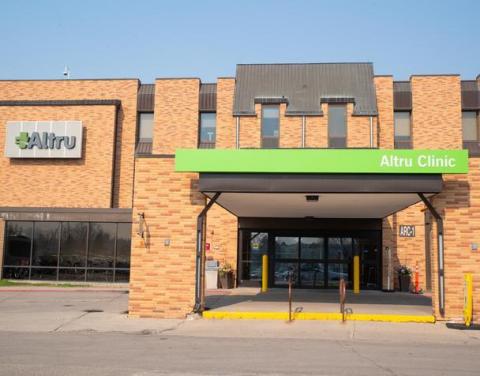Altru's Pulmonary Lab provides diagnostic and therapeutic services to patients with a variety of pulmonary disorders. Provided in Grand Forks since 1981, the Pulmonary Lab includes four Pulmonary Function Testing rooms that include state of the art equipment. Our physicians are board-certified in pulmonary and sleep medicine. The technicians are registered respiratory therapists who are certified or registered in pulmonary function.
For more information on Altru's Pulmonary Lab, please call 701.780.6400 or toll-free 800.732.4277, ext. 6400.
Pulmonary Tests
Pulmonary function tests can help a doctor diagnose a range of respiratory diseases which might not otherwise be obvious to the doctor or patient. Lung problems can be successfully treated if detected early. The pulmonary function tests are used to measure how a lung disease is progressing and can also be used to assess how well a patient is responding to different treatments.
- Screening Spirometry - Measures how much air you can take into your lungs and how much air you can blow out
- 6-Minute Walk Test - To assess a patient's functional capacity in patients with moderate to severe heart or lung disease.
- Pre and Post Bronchodilator Spirometry - Spirometry performed before and after a bronchodilator is administered
- Diffusion Capacity - Estimates how much oxygen is transported from the alveoli to your blood
- Lung Volumes - Measures how much air you inhale and how much air is left in your lungs after you exhale
- Maximum Voluntary Ventilation - Assesses respiratory muscle strength
- Maximal Inspiratory and Expiratory Pressures - Assesses respiratory muscle strength
- Methacholine Challenge - Helpful in evaluating cough or possible asthma
- Walking Oxygen Desaturation Studies - To measure the level of oxygen in your blood at rest and with exercise
- Bronchoscopies - To examine lung tissue for any damage or inflammation. During bronchoscopy, small samples of lung tissue may be taken (biopsy) to confirm the diagnosis of your lung problem.
- Arterial Blood Gas Analysis - To measure the amounts of oxygen and carbon dioxide in your blood
- Pentamadine Treatments - An aerosolized medication used for treatment and prophylaxis of immuno-compromised individuals
- Sputum Inductions - To identify any microorganisms that may be present in expectorated sputum
Electromagnetic Navigational Bronchoscopy®
Electromagnetic Navigational Bronchoscopy® (ENB) extends the reach of a bronchoscope to regions deep within the lung. It uses GPS-like technology to guide and steer catheters through complex airways, reaching distant regions of the lung that traditional bronchoscopy cannot.
ENB technology improves diagnosis and treatment for Altru patients, minimizing the need for more invasive, surgical procedures, and sometimes detecting lung disease or cancer earlier.
How It Works
- After a physician locates a lesion, or spot, deep on the lung through an X-ray, CT-Scan or PET-CT, the image is loaded onto planning software that creates a 3D map of the lungs.
- A bronchoscope is placed through the mouth and into the airways of the lungs.
- Catheters are places in the bronchoscope channel, where electromagnetic sensors guide the physician to the targeted lesion.
- Once at the targeted lesion, the guide catheter is removed and the extended working channel catheter remains.
- The biopsy tools can be extended to collect tissue samples for testing, diagnosis or placing a marker for treatment.
Learn more about ENB in this Wellness In One.
Pulmonary Diseases
- Chronic Obstructive Pulmonary Disease
- Asthma
- Emphysema
- Acute Bronchitis
- Obstructive Sleep Apnea
- Sarcoidosis
- Pulmonary Fibrosis
- Pneumonia
- Lung Cancer
- Pulmonary Hypertension
- Alpha 1 - Antitrypsin Deficiency
- Tuberculosis
- Cystic Fibrosis
Forms
- Patient Instructions for Pulmonary Function Test
- Patient Instructions for Methacholine and Exercise Challenge
- Walking Desaturation Study/6-Minute Walk Test Instructions
Additional Resources
- American Thoracic Society (ATS)
- American Lung Association (ALA)
- American Academy of Sleep Medicine (AASM)
- American Association of Cardiovascular and Pulmonary Rehabilitation (AACVPR)
- American College of Chest Physicians (ACCP)


